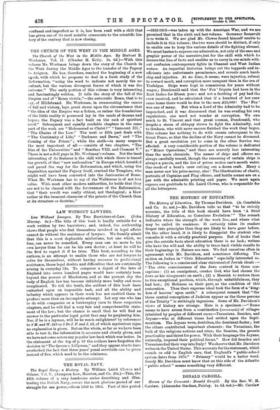LAW WITHOUT LAWYERS.
Law Without Lawyers. By Two Barristers-at-Law. (John Murray. 6s.)—The title of this book is hardly suitable for a work written by two barristers ; and, indeed, the authorship shows that people who find themselves involved in legal affairs cannot do without the assistance of lawyers. We frankly admit that this is a most deplorable misfortune, but one which, we fear, can never be remedied. Every man can no more be his own lawyer than he can be his own doctor ; at least he will be the first to regret it if he tries. This book, according to the authors, is an attempt to enable those who are not lawyers to solve for themselves, without having recourse to professional assistance, those legal doubts and difficulties that are continually arising in everyday life. To compress a digest of the laws of England into seven hundred pages would have certainly been beyond the powers of Blackstone, and at the present day the body of English law has become infinitely more bulky and more complicated. To tell the truth, the authors of this book have embarked upon an impossible task, and all the ability and industry which appears in their work has not enabled them to produce more than an incomplete attempt. Let any one who has to do with companies or a bankruptcy turn to those respective chapters, and he will find a very fair and comprehensible state- ment of the law ; but the chance is small that he will find an answer to the particular legal point that may be perplexing him. Nor, if he is a layman, will he be much enlightenad by references to 9K. and W. 849 or 3 De J. F. and 1.24, of which mysterious signs no explanation is given. But on the whole, so far as we have been able to test it, the information is accurate and clearly given, and we have not come across any popular law-book which was better. In the statement at the top of p. 19 the authors have forgotten the decision in "The Queen v. Lillyman," and they appear also to have overlooked the fact that three years' penal servitude can be given instead of five, which used to be the minimum.


















































 Previous page
Previous page